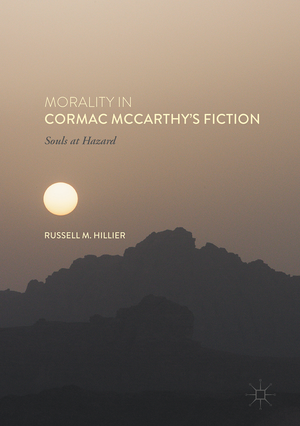Morality in Cormac McCarthy's Fiction: Souls at Hazard
Autor Russell M. Hillieren Limba Engleză Hardback – 8 mar 2017
| Toate formatele și edițiile | Preț | Express |
|---|---|---|
| Paperback (1) | 727.97 lei 6-8 săpt. | |
| Springer International Publishing – 3 mai 2018 | 727.97 lei 6-8 săpt. | |
| Hardback (1) | 895.07 lei 6-8 săpt. | |
| Springer International Publishing – 8 mar 2017 | 895.07 lei 6-8 săpt. |
Preț: 895.07 lei
Preț vechi: 1091.55 lei
-18% Nou
Puncte Express: 1343
Preț estimativ în valută:
171.26€ • 178.83$ • 141.43£
171.26€ • 178.83$ • 141.43£
Carte tipărită la comandă
Livrare economică 15-29 aprilie
Preluare comenzi: 021 569.72.76
Specificații
ISBN-13: 9783319469560
ISBN-10: 3319469568
Pagini: 391
Ilustrații: X, 317 p.
Dimensiuni: 148 x 210 mm
Greutate: 5.26 kg
Ediția:1st ed. 2017
Editura: Springer International Publishing
Colecția Palgrave Macmillan
Locul publicării:Cham, Switzerland
ISBN-10: 3319469568
Pagini: 391
Ilustrații: X, 317 p.
Dimensiuni: 148 x 210 mm
Greutate: 5.26 kg
Ediția:1st ed. 2017
Editura: Springer International Publishing
Colecția Palgrave Macmillan
Locul publicării:Cham, Switzerland
Cuprins
Chapter 1.- Introduction.- Chapter 2. “Give the Devil His Due”: Judge Holden’s Design in Blood Meridian.- Chapter 3. “Antic Clay”?: The Competing Ethical Appeals of Blood Meridian.- Chapter 4. “A Knowing Deep in the Bone”: Cowboy Stoicism and Tragic Heroism in All the Pretty Horses.- Chapter 5. “Like Some Supplicant to the Darkness Over Them All”: The Good of John Grady Cole in Cities of the Plain.- Chapter 6. “Nothing is Crueler Than a Coward”: No Country for Old Men and The Counselor as Tragic Fables of the Contemporary Southwest.- Chapter 7. Coda — The Good of Story in The Road.- Bibliography.- Index.
Recenzii
“Hillier focuses on examining one aspect of McCarthy’s moral vision in each chapter, the result of which is a book that is well organized around this central theme. Hillier includes quotations from McCarthy’s novels in his chapter titles, each of which fittingly summarizes the moral concerns in the narratives. His scholarship, which is rooted in the Western literary and intellectual tradition, in combination with his nuanced textual readings and his unearthing of frequently overlooked textual clues makes his argument insightful and compelling.” (Aihua Chen, Soundings, Vol. 101 (04), 2018)
Notă biografică
Russell M. Hillier is Associate Professor of English at Providence College, Rhode Island, USA. He is the author of Milton’s Messiah (2011) and has published numerous scholarly articles on William Shakespeare, John Milton, John Donne, George Herbert, Samuel Taylor Coleridge, John Keats, Fyodor Dostoevsky, and Cormac McCarthy.
Textul de pe ultima copertă
This book argues that McCarthy’s works convey a profound moral vision and explores how McCarthy uses intertextuality, moral philosophy, and questions of genre to advance that vision. Russell M. Hillier focuses upon the ways in which McCarthy’s fiction is in ceaseless conversation with literary and philosophical tradition, examining McCarthy’s investment in influential thinkers from Marcus Aurelius to Hannah Arendt, and poets, playwrights, and novelists from Dante and Shakespeare to Fyodor Dostoevsky and Antonio Machado. Hillier shows how McCarthy’s fiction grapples with abiding moral and metaphysical issues: the nature and problem of evil; the idea of God or the transcendent; the credibility of heroism in the modern age; the question of moral choice and action; the possibility of faith, hope, love, and goodness; the meaning and limits of civilization; and the definition of what it is to be human. This study should appeal alike to readers, teachers, and scholars of Cormac McCarthy.
Caracteristici
Focuses primarily on the later works of McCarthy Uses a broad range of source materials, from archives to primary texts
